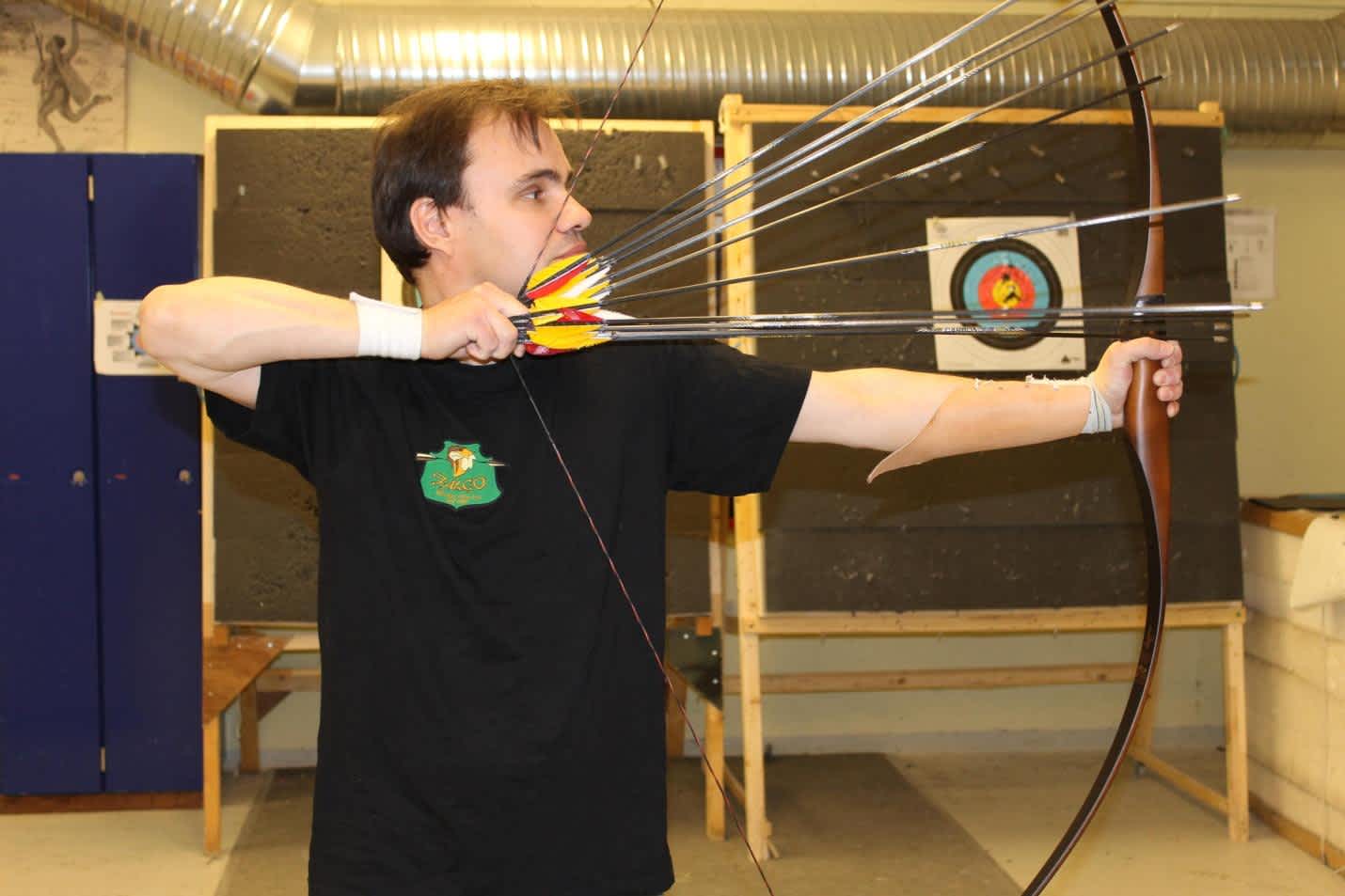Lars Andersen: Artist, Historian, and Amazing Rapid-fire Archer
K.J. Houtman 07.08.13

Hundreds of years ago, even thousands of years ago, archers fired arrows very rapidly. One would think improvements in technology, such as lightweight materials and state-of-the-art machining, would make our equipment today far superior. Today’s archers are faster than those of medieval times and before, right? Nope.
All but one: a Danish archer (and artist) named Lars Andersen, who has perfected the art and skill of speed archery.
“I watched a video of past winners [of a speed archery competition], and my first reaction was that it did not seem particularly fast,” shared Andersen from his home in Denmark via email. “So I made a test and the first time I tried I beat their record.” First time. Without training.
This early success motivated Andersen to push himself further, taking fast shooting seriously. He trained and entered competitions–and won by huge margins.
Driven by new information from a friend who researched historical “war archery,” Andersen’s focus changed. He became fascinated with ancient skill and ability.
“I discovered historical texts that [described] Saracens who fought with the Crusaders had a series of tests which had been preserved. For example, one test required, at a 60-bow distance, to shoot three arrows so quickly that the last shall be in the air before the first has hit,” added Lars. “That is three arrows in one-and-a-half seconds. That motivated me to accomplish it.”
Fast forward several years later with heavy training under his belt, Andersen has now achieved an impressive shooting technique. Both fast and accurate, he accomplished what many thought was simply legend or folklore.
Don’t judge the computer-like voice-over of this five-minute video, but rather take in the phenomenal archery skills of Lars Andersen. Just over 2.1 million people have viewed this video worldwide.
When asked if anyone is faster than he is, and whether he still competes in events, Lars confidently answered no. “Today there is no one in the world that can shoot half the speed as I do, so there is no reason to enter tournaments.”
I envision Lars Andersen as part historian, part artist, and part archer, combining his unique traits in a nearly unbelievable way. “I aim without any kind of anchor point or fixed draw length, and I can switch the bow between both hands. Perhaps I do have an advantage because I am an artist, because I am really good at turning objects inside my head in three dimensions. It makes it easier for me to shoot a bow without having to use fixed points.”

What a shame this technique stayed lost for so long. Thankfully reclaimed, this age-old style of archery might otherwise have slipped through generational fingertips. Andersen holds multiple arrows in his hand (left or right) and has perfected shooting from many different positions without a fixed draw length using a three-finger grip.
“When training on specific skill improvements, I practice almost every day,” shared Lars. “If I’m just maintaining skills, I shoot about four days a week.” You can imagine that when you shoot arrows as fast as Lars Andersen, you can put through a lot of arrows in a practice session. “I don’t even know how many I shoot. My friends at Lyngby Bow Guild (Denmark’s biggest bow club) tease me that I shoot 1,000 arrows. It probably isn’t that many, but I arrive with 60 arrows and I shoot them many times, so it is a lot.”
Through paintings and books, we know all many ancient and medieval cultures used bows as effective weapons. Much knowledge of the old techniques has been lost, but a few books and tales have documented historical successes and facts. For example, legend said Chief Hiawatha shot off 10 arrows before the first hit the ground. Andersen recreated that feat in the video, too.
What specifically does Lars attribute as the most daunting component of this technique? “Mastering extreme control over a single arrow is the key,” shared the Dane. He tried to teach a few others to do what he did and realized a mistake in teaching was starting with multiple arrows in a hand. “Should I one day teach again, I will make a program where the student may not have more than one arrow in their hand, until they have learned full control of this one arrow. And I will also try to create a system based on fixed points, instead of floating points because it was also a problem for those I taught.” Perhaps Andersen’s artistic eye just sees things differently. “I shoot instinctually and automatically release an arrow now.”
I am glad this man was curious enough to seek out an answer and industrious enough to perfect the skill. For this little slice of history, reclaimed by this talented Dane, I say “Hear, hear!” Well done, Lars.
K.J. Houtman is the author of the award-winning Fish On Kids Books series, chapter books for eight- to 12-year-olds with adventures based around fishing, camping, and hunting. Her work is available at Amazon and local bookstores. Find out more at fishonkidsbooks.com.

